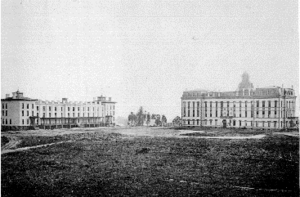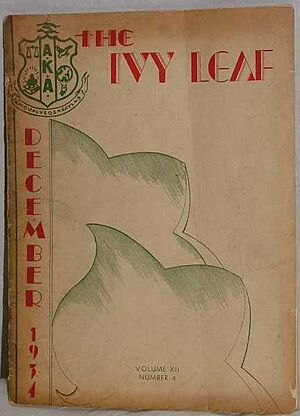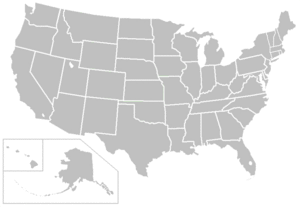Alpha Kappa Alpha facts for kids
Quick facts for kids Alpha Kappa Alpha |
|
|---|---|
| ΑΚΑ | |
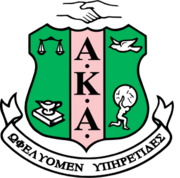 |
|
| Founded | January 15, 1908 Howard University |
| Type | Social sorority |
| Affiliation | NPHC |
| Emphasis | African-American |
| Scope | International |
| Motto | "By Culture and By Merit" |
| Colors | Salmon Pink Apple Green |
| Symbol | Ivy leaf |
| Flower | Pink Tea Rose |
| Publication | Ivy Leaf |
| Chapters | 1,085 |
| Members | 90,000 collegiate 365,000+ lifetime |
| Nicknames | AKAs, Alpha Women, Ivies |
| Headquarters | 5656 S. Stony Island Avenue Chicago, Illinois 60637 United States |
Alpha Kappa Alpha Sorority, Inc. (ΑΚΑ) is a special club for women. It is known as a sorority. This group was started by African-American women. It began in 1908 at Howard University in Washington, D.C.. Alpha Kappa Alpha was officially recognized as a company in 1913. It is part of the National Pan-Hellenic Council (NPHC). This council is a group of historically Black fraternities and sororities. They are often called the Divine Nine.
In 2025, Alpha Kappa Alpha had over 365,000 members. It had 1,085 chapters in the United States and eleven other countries. Women can join while in college. They can also join after finishing college.
Contents
History of Alpha Kappa Alpha
How It Began: 1907–1912
In 1907, a student named Ethel Hedgemon Lyle wanted to start a sorority. She was at Howard University in Washington, D.C.. Starting a sorority was a big step for African-American women. At that time, they had few chances to lead. A teacher, Ethel T. Robinson, encouraged Ethel. She told Ethel about sororities at Brown University. Ethel Hedgemon then found other interested classmates. They spent the summer of 1907 learning about how to create their new group.
In November 1907, Ethel Hedgemon and Marie Woolfolk Taylor spoke to the university. They asked for permission to start a sorority. The university said yes right away. This made Alpha Kappa Alpha the first sorority of the Divine Nine. It was the first to be created at a historically Black college or university. Nellie Quander was chosen as the sorority's first president.
On January 15, 1908, the nine founders had their first meeting. It was held in Miner Hall. On February 21, 1908, seven more students joined. They were also called founders. In its first months, Alpha Kappa Alpha created its rules. They also held fun events. They gave presentations to the public. On May 1, 1908, members planted ivy and a tree. This was on the Howard campus. The university later adopted this tradition.
The sorority's first official joining ceremony was on February 11, 1909. It was in Miner Hall. On May 25, 1909, Alpha Kappa Alpha held its first Ivy Day. This was a celebration. It included planting ivy at Miner Hall. The sorority started many ways to help others. This included helping to create the NAACP and the YWCA. They also fed people who were hungry. They tutored students and gave clothes to people in need.
Becoming Official: 1912–1913
By the end of the 1911–12 school year, Alpha Kappa Alpha had over forty members. In October, former president Nellie Quander was asked to a meeting. At this meeting, members wanted to change the sorority's name, colors, and symbols. Nellie Quander disagreed. She said they could not make such changes. She told them to ask all members to vote. The vote showed most members did not want changes.
Some college members who wanted changes held a meeting. They voted to start a new group. This group became Delta Sigma Theta. Nellie Quander then formed a committee. This committee worked to make Alpha Kappa Alpha an official organization. This would make sure it continued. Alpha Kappa Alpha Sorority became the first African-American sorority to be officially recognized across the country. This happened on January 29, 1913.
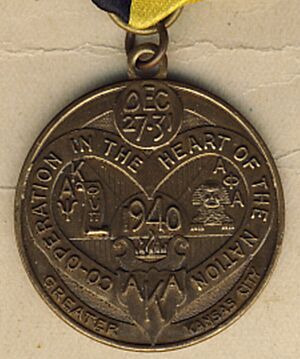
Growing and Helping Communities: 1913–1940
Alpha Kappa Alpha helped its members. It gave money for school and for studying abroad. It also raised money for Howard University's Miner Hall. It was the first Black sorority at Howard to offer scholarships.
A second chapter of Alpha Kappa Alpha started at the University of Chicago in 1913. The sorority held its first big meeting, called a Boulé, at Howard University in December 1918. The sorority's promise was written by Grace Edwards. It was accepted in 1920. Also, the sorority's crest was designed by Phyllis Wheatley Waters. It was accepted at the same meeting.
In 1921, the Ivy Leaf became the sorority's official magazine. Founders' Week was also started. This week honors the women who created Alpha Kappa Alpha. Pearls were first used by the sorority in the same year. The sorority's membership pin was approved in 1922. Later, in 1947, pins for special honorary members were designed.
By 1920, the sorority had a national plan to help communities. By May 1924, Alpha Kappa Alpha started its career guidance program. During the Great Migration, members helped many Black people. They helped them move from the South to the North. They helped them find homes and learn about new cities. Members also volunteered at the Freedman's Hospital.
In 1921, the sorority suggested that other Black fraternities and sororities form a council. On May 10, 1930, Alpha Kappa Alpha joined with other groups. These included Kappa Alpha Psi, Omega Psi Phi, Delta Sigma Theta, and Zeta Phi Beta. Together, they formed the National Pan-Hellenic Council (NPHC) at Howard University.
In April 1933, the sorority's international president, Ida Louise Jackson, visited a school in Lexington, Mississippi. She saw how hard life was in the Mississippi Delta during the Great Depression. Many teachers had only a seventh-grade education. African Americans were struggling to make a living farming.
In the summer of 1934, Ida Jackson started a summer school for teachers. She trained 22 student teachers and taught 243 children. She also held night classes for 48 adults. She got 2,600 books for the school's library. This made it the biggest library in Holmes County.
In December 1935, the Boulé approved $1,000 for a health clinic in Mississippi. The clinic opened in 1938. It became the Mississippi Health Project. Alpha Kappa Alpha member Dorothy Boulding Ferebee led this project. The Mississippi Health Project brought basic medical care to Black people in rural areas. It ran for six summers. It was the first mobile health clinic in the United States. It helped about 15,000 people. The project helped lower cases of diphtheria and smallpox. It also improved health habits.
Norma Elizabeth Boyd led the sorority to create a group in 1938. It was called the National Non-Partisan Lobby on Civil and Democratic Rights. It later changed its name. This was the first full-time group to work with the government for civil rights for minority groups. This group worked with other organizations. These included the NAACP and the National Urban League. The group stopped its work on July 15, 1948.
In August 1945, Alpha Kappa Alpha started the American Council on Human Rights (ACHR). This group gave ideas to the government. These ideas were about civil rights laws. In October 1946, Alpha Kappa Alpha was the first sorority to have a special role at the United Nations. On January 25, 1948, other sororities and fraternities joined the ACHR.
On September 1, 1945, Alpha Kappa Alpha opened a National Health Office in New York City. This office worked with local chapters. It also worked with the ACHR to promote health. It aimed to increase the number of student nurses. It also worked to improve health programs at historically black colleges and universities. The National Health Office closed in 1951. Its goals were then part of the sorority's main programs.
Civil Rights and Education: 1950–1970
From the 1950s to the 1970s, Alpha Kappa Alpha members helped with many programs. These included job training, reading help, and youth programs. The sorority helped young people improve their math, science, and reading skills. This showed their dedication to helping communities. To get money, Alpha Kappa Alpha started a fashion show called Fashionetta in 1953. The ACHR continued to work for equal civil rights. It focused on laws about education, transportation, and jobs. It also worked to improve equality in the armed forces and public places. The ACHR helped with important civil rights cases. However, the ACHR decided to stop its work in 1963.
Alpha Kappa Alpha helped inner-city youth. On August 20, 1964, President Lyndon B. Johnson signed a law. This law allowed the creation of the Job Corps. The sorority wanted to run a job training center for students. They worked with the government. Alpha Kappa Alpha received a $4 million grant. This was to run the Cleveland Job Corps in Cleveland, Ohio. This made them the first sorority to run a federal job training center. Starting in 1965, the Cleveland Job Corps trained young women. They were high school dropouts aged 16 to 21. They learned job and educational skills. In 1976, the center also started accepting males. The sorority ran the Cleveland Job Corps until 1995.
The sorority published The Heritage Series from 1968 to 1972. These were small books. They told the stories of important African-American women. Alpha Kappa Alpha also gave $20,000 to help save Martin Luther King Jr.'s birthplace in Atlanta, Georgia. This was in the early 1970s. In 1978, for the sorority's 70th anniversary, a special window was put in at Howard University. It honored the founders of Alpha Kappa Alpha.
Moving Towards the 21st Century: 1980–2007
After its 75th anniversary, Alpha Kappa Alpha helped reduce poverty in Africa. They started the African Village Development Program (AVDP). This program worked with Africare. It aimed to lessen poverty in African villages. The sorority also built ten schools in South Africa after apartheid ended. They also gave computer technology to the region.
The sorority continued to offer after-school programs. One was called ON TRACK. This program helped 20,000 third graders who were struggling in school. Other programs, like the Ivy Reading AKAdemy, helped improve reading skills. The Young Authors Program helped with writing. PIMS focused on math and science.
After Hurricane Katrina in 2005, the sorority raised money for disaster relief. In July 2007, they helped build a house in New Orleans. This was for a family who survived Hurricane Katrina. They worked with Habitat for Humanity.
Other Alpha Kappa Alpha projects raised awareness about health issues. These included AIDS, sickle cell anemia, breast cancer, and the importance of staying healthy. The sorority also supported justice for the Jena Six. They also worked with African Ancestry. This allowed members to use DNA testing. They could find out about their family history.
100-Year Celebration: 2008
Alpha Kappa Alpha celebrated its 100th birthday in 2008. The celebration lasted a whole year. It happened at the same time as the sorority's big meeting, the Boulé. Many members traveled to Howard University from January 12 to January 15, 2008. They gave $1 million in scholarships to Howard University. They also gave libraries to a middle school and a senior citizens' home. They showed a digital version of their Ivy Leaf magazine.
From July 11 to July 18, 2008, Alpha Kappa Alpha held its 63rd Boulé. This included a public meeting. There was also a march with other NPHC members. A concert featured honorary member Patti LaBelle. On July 17, 2008, Alpha Kappa Alpha Sorority set a Guinness World Record. A total of 16,206 members had the largest sit-down dinner at a convention.
The United States Congress praised Alpha Kappa Alpha's achievements. U.S. Senator Hillary Clinton and sorority member U.S. Representative Sheila Jackson-Lee introduced laws to honor the sorority's founding. Also, the toy company Mattel made a Barbie doll. It wore a pink and green evening gown.
Symbols of Alpha Kappa Alpha
The sorority's motto is "By Culture and By Merit." Its colors are salmon pink and apple green. Its symbol is the Ivy leaf. Its flower is the pink tea rose. Its magazine is called the Ivy Leaf.
Members of the sorority call each other soror. This word comes from Latin and means "sister." Members who have passed away are called "Ivies Beyond the Wall."
Joining Alpha Kappa Alpha
Women can join Alpha Kappa Alpha in college. They can also be invited to join after they have a college degree. Being an honorary member is the highest honor.
To show interest, a person attends a meeting called a "rush." After getting an official letter, they can start the joining process. Future members must have good grades. They also need a history of helping the community. If someone has graduated, they might be invited to join by a graduate chapter.
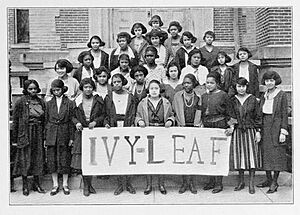
Ivy Leaf Pledge Club
In the past, potential members would join the Ivy Leaf Pledge Club. This was before they officially joined the sorority. In a book, Lawrence Otis Graham shared his aunt's experience. She said they learned a lot about the sorority's history. They wrote long letters to the Ivy Leaf Pledge Club. They also went to monthly meetings. Older students taught them about the history.
According to Graham, the sorority had a "Pledge Week." During this time, members checked a candidate's grades and behavior. Candidates who did well during this week were then officially welcomed into the sorority.
How Alpha Kappa Alpha is Led
The sorority's leadership in the early years came from three groups. These were the first group, the sophomores, and the women who made it official. Together, they are known as "The Twenty Pearls." Since 1949, twelve members have been the executive director.
The Twenty Pearls
|
Original group of 1908:
|
Sophomores of 1910:
|
Incorporators of 1913: |
International Presidents
Below are the thirty International Presidents since 1913. The word "Supreme" is added to the title of an international leader. For example, Supreme Basileus.
- Nellie Quander (1913)
- Lorraine Richardson Green (1919)
- Lottie Pearl Mitchell (1923)
- Pauline S. Puryear (1925)
- B. Beatrix Scott (1927)
- Maudelle Brown Bousfield (1929)
- Maude B. Porter (1931)
- Ida L. Jackson (1933)
- Margaret D. Bowen (1936)
- Dorothy B. Ferebee (1939)
- Beulah T. Whitby (1941)
- Edna O. Campbell (1946)
- Laura Lovelace (1949)
- Arnetta G. Wallace (1953)
- Marjorie H. Parker (1958)
- Julia B. Purnell (1962)
- Larzette Hale (1966)
- Mattelia B. Grays (1970)
- Bernice I. Sumlin (1974)
- Barbara K. Phillips (1978)
- Faye B. Bryant (1982)
- Janet Jones Ballard (1986)
- Mary Shy Scott (1990)
- Eva L. Evans (1994)
- Norma S. White (1998)
- Linda White (2002)
- Barbara A. McKinzie (2006)
- Carolyn House Stewart (2010)
- Dorothy Buckhanan Wilson (2014)
- Glenda Glover (2018)
- Danette Anthony Reed (2022 – Present)
Boulé: The Main Meeting
The Boulé is the sorority's main meeting. It happens every two years. The first Boulé was at Howard University in December 1918. Meetings used to be held every December. There was no Boulé in 1942 because of World War II. After 1964, Boulé meetings started happening every two years. The 69th Boulé, planned for July 2020, was canceled due to health concerns.
Important speakers at Boulé meetings have included civil rights leaders. These include Martin Luther King Jr. and Roy Wilkins.
Chapters Around the World
After starting 32 chapters by 1924, Alpha Kappa Alpha organized them by region. These regions are in the United States and other countries. The Boulé decides where the regions are. Each of the ten regions has a director. This director is part of the sorority's board. In 2025, Alpha Kappa Alpha has 1,085 chapters. These are in the United States and eleven other countries. For chapters made of college graduates, "Omega" is added to their name. This helps tell them apart from college student chapters.
Helping Others: Philanthropy
Ivy Acres: Senior Living
Senior Residences, Incorporated is a group connected to Alpha Kappa Alpha. It is building Ivy Acres. This is a retirement center in Winston-Salem, North Carolina. Ivy Acres will be one of the first retirement centers started by African Americans. It will have apartments for independent living, assisted living, and nursing care. Residents will pay a monthly fee for services. The planning for Ivy Acres cost about $32 million.
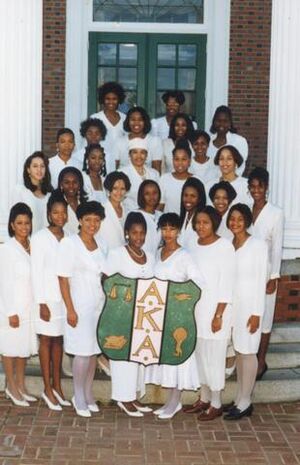
Ivy Reading AKAdemy
The sorority's Ivy Reading AKAdemy helps children learn to read. It focuses on early learning. It helps kids master basic reading skills by the end of third grade.
Leadership Fellows Program
The Leadership Fellows Program trains young Alpha Kappa Alpha members. It helps them prepare for leadership roles. These members also help with community service for one week. In the past, this program has been supported by the Educational Advancement Foundation. Companies like Pillsbury, Tyson Foods, Johnson & Johnson, and General Electric have also helped pay for it.
Partnerships in Mathematics and Science (PIMS)
The sorority started PIMS in 1994. This program encourages Black girls to study math, science, and technology. The National Science Foundation and Black colleges helped promote the program. Many chapters offered two-week summer camps for math and science.
Young Authors Program
The Young Authors Program helps children in kindergarten through third grade. It encourages them to read and write. Each of the sorority's ten regions chose a child's story. These stories were published in a two-book collection. It was called The Spirit Within: Voices of Young Authors.
The Alpha Kappa Alpha Foundation
Alpha Kappa Alpha has a special group called the Educational Advancement Foundation (EAF). It is a separate, non-profit part of the sorority. Its goal is to "provide financial support to individuals and organizations engaged in lifelong learning." The foundation gives money for school. This includes scholarships for sorority members and others. It also gives money for community service projects.
The foundation was started in 1978 by Constance Holland. She is the sister of a former Alpha Kappa Alpha International president. It officially began in 1980. The sorority gave $10,000 to start it. Eight years later, the group gave $10,000 to fourteen students. In 1991, EAF gave small grants to community groups. In 1998, EAF gave its first award to a college student.
For its 20th anniversary in 2000, EAF published a book. It was called Perpetuating Our Posterity: A Blueprint for Excellence. This book told the history of the organization. It also gave advice for new charity groups.
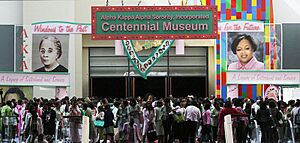
For the sorority's 100th birthday, the foundation created an exhibit. It traveled to several U.S. cities from 2006 to 2008. The foundation also gave $2 million to Howard University. Half of the gift went to a research center. This center keeps historical items, photos, and documents of Alpha Kappa Alpha. The other half went to a scholarship fund. This fund helps female students at Howard University.
Famous Members
In 2025, Alpha Kappa Alpha has welcomed over 365,000 women. It has 90,000 active members. Most members are college graduates. Former Vice President Kamala Harris is one of the sorority's most well-known members. She joined when she was at Howard University.
See also
 In Spanish: Alpha Kappa Alpha para niños
In Spanish: Alpha Kappa Alpha para niños
 | Janet Taylor Pickett |
 | Synthia Saint James |
 | Howardena Pindell |
 | Faith Ringgold |


